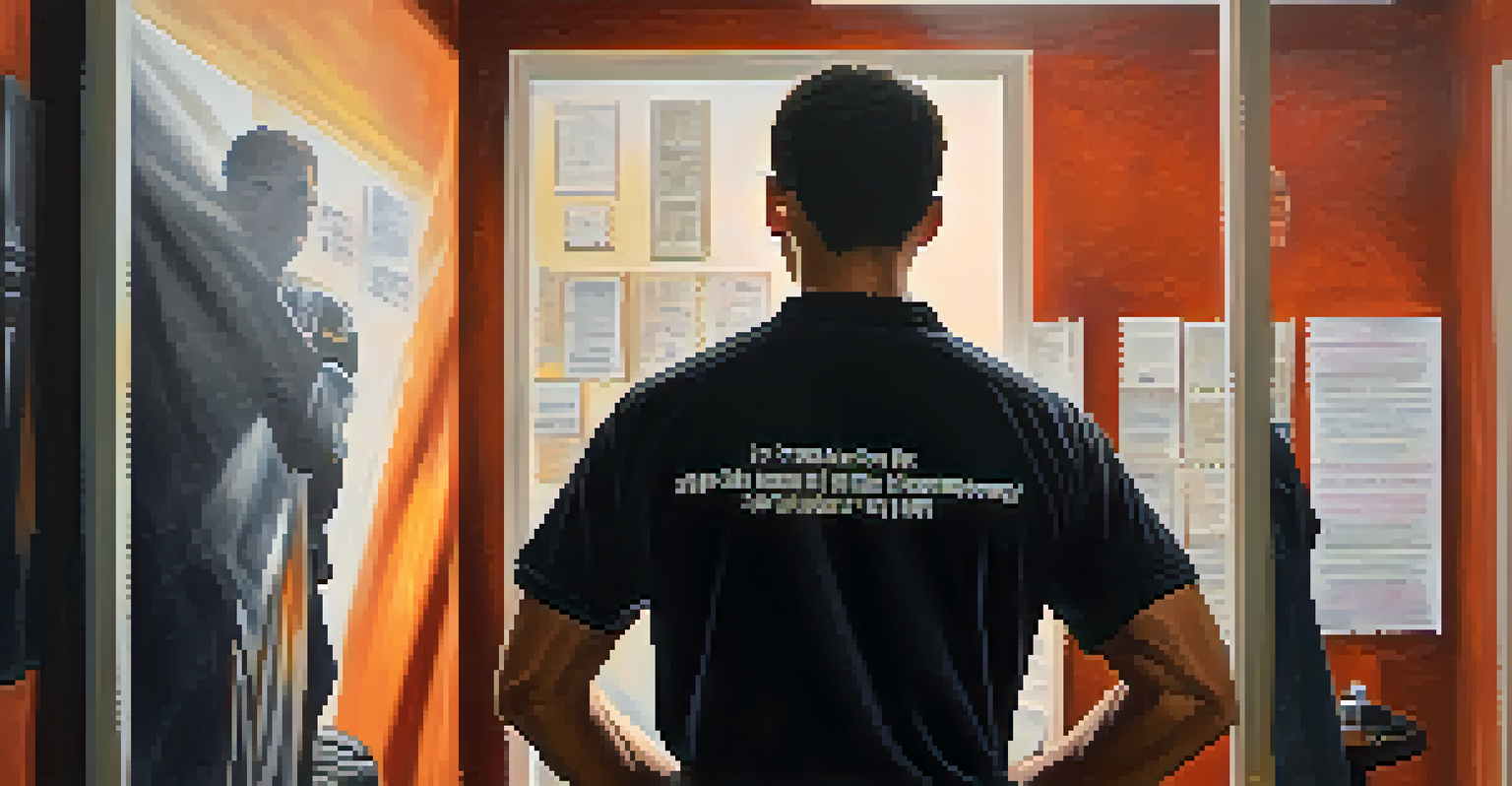Training Your Brain: Mental Exercises for Self Defense Readiness

Understanding the Importance of Mental Preparedness
Mental preparedness is just as vital as physical training in self-defense. When faced with a threat, how you respond mentally can determine the outcome of the situation. A clear, focused mind allows for quicker decision-making and more effective action.
The greatest weapon against stress is our ability to choose one thought over another.
Consider how athletes train their minds just as rigorously as their bodies. They visualize their performances, anticipate challenges, and mentally rehearse strategies. This kind of mental conditioning is essential for anyone looking to enhance their self-defense skills.
By prioritizing mental exercises, you can build the resilience needed to remain calm and collected in stressful situations. Just like physical self-defense techniques, mental readiness can be trained and improved over time.
Visualization Techniques: Seeing Success
Visualization is a powerful tool that involves imagining yourself successfully navigating a self-defense scenario. By vividly picturing yourself responding effectively to a threat, you create a mental blueprint for real-life situations. This practice can increase confidence and reduce anxiety when faced with danger.

To get started, find a quiet space and close your eyes. Picture a specific scenario, such as encountering an aggressive individual. Visualize each step you would take—how you would stand, your facial expressions, and the actions you'd perform.
Mental Preparedness is Key
A clear and focused mind enhances decision-making during self-defense situations.
The more detailed your visualization, the more effective it becomes. Consistent practice can help you react instinctively and with greater assurance during actual confrontations.
Mindfulness and Its Role in Self-Defense
Mindfulness is the practice of being present and fully engaged in the moment, which can significantly enhance your self-defense readiness. By training your mind to focus on the here and now, you can better assess your surroundings and identify potential threats. This heightened awareness is crucial in self-defense situations.
Success is where preparation and opportunity meet.
Incorporating mindfulness into your daily routine can be as simple as practicing deep breathing or engaging in meditation. These techniques help clear your mind and sharpen your focus, making it easier to respond calmly when faced with danger.
Moreover, mindfulness can reduce stress and anxiety, which often cloud judgment. A clear mind allows you to think critically and make sound decisions, giving you an advantage in any confrontation.
Cognitive Challenges: Sharpening Your Mind
Engaging in cognitive challenges is another effective way to train your brain for self-defense. Activities like puzzles, memory games, and strategy-based games can enhance your problem-solving skills and mental agility. These skills are directly applicable when you need to think on your feet during a potential threat.
For example, consider playing chess or engaging in escape room challenges. Both require quick thinking and strategic planning, mirroring the mental demands of a self-defense situation. The more you practice these cognitive challenges, the more adept you become at assessing and responding to unexpected scenarios.
Visualization Boosts Confidence
Imagining successful responses to threats creates a mental blueprint for real-life scenarios.
Additionally, regular mental workouts can help improve your reaction times, making you quicker to respond when it matters most.
Situational Awareness Drills: Training Your Senses
Situational awareness is the ability to perceive and understand your environment, and practicing drills can significantly improve this skill. Try walking in different environments and consciously observe your surroundings—take note of exits, people, and potential hazards. This practice will help you stay alert and ready to react in real-life situations.
You can also practice awareness drills with friends or family. Set up scenarios where they act unpredictably, and you must assess and respond appropriately. This kind of training can simulate high-stress situations, preparing your brain for real-life encounters.
By consistently honing your situational awareness, you'll become more adept at detecting threats before they escalate, empowering you to take proactive measures.
Stress Management Techniques: Staying Calm Under Pressure
Learning to manage stress is essential for maintaining mental clarity during a self-defense situation. Techniques such as progressive muscle relaxation or deep breathing exercises can help reduce physiological stress responses. When your body remains calm, your mind can focus on making rational decisions.
Practice these techniques regularly, even in low-stress situations, so they become second nature when you need them most. For instance, take a few deep breaths before entering a crowded area or during a challenging day at work. This simple act can help center your thoughts and prepare you for whatever comes next.
Continuous Learning is Essential
Staying informed through education and practice keeps your self-defense skills sharp and relevant.
By mastering stress management, you develop a sense of control that can be invaluable in a confrontation, enabling you to respond effectively rather than react impulsively.
Continuous Learning: Expanding Your Knowledge
Self-defense is a dynamic field, and continuous learning is vital for staying prepared. Reading books, attending workshops, or participating in self-defense classes can equip you with new strategies and mental frameworks. The more knowledge you have, the more confident you'll feel in your ability to handle various situations.
Consider joining online forums or communities focused on self-defense. Engaging in discussions and sharing experiences can broaden your perspective and introduce you to different techniques. Learning from others can inspire you to try new approaches both mentally and physically.

By committing to continuous education, you ensure that your mental exercises remain relevant and effective, keeping your self-defense skills sharp.